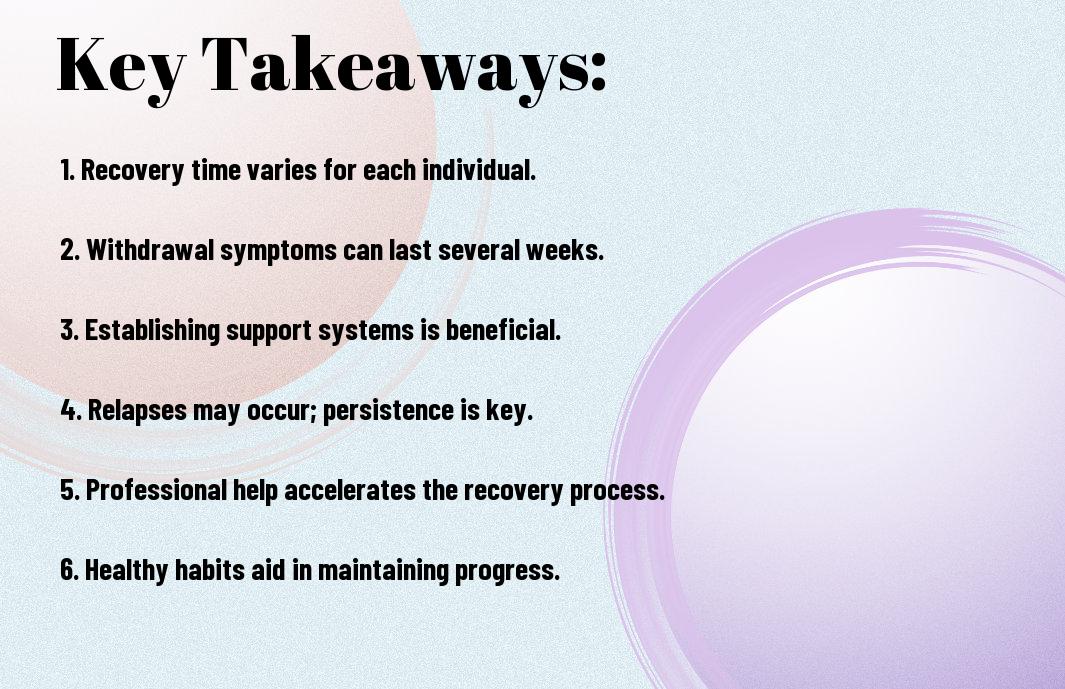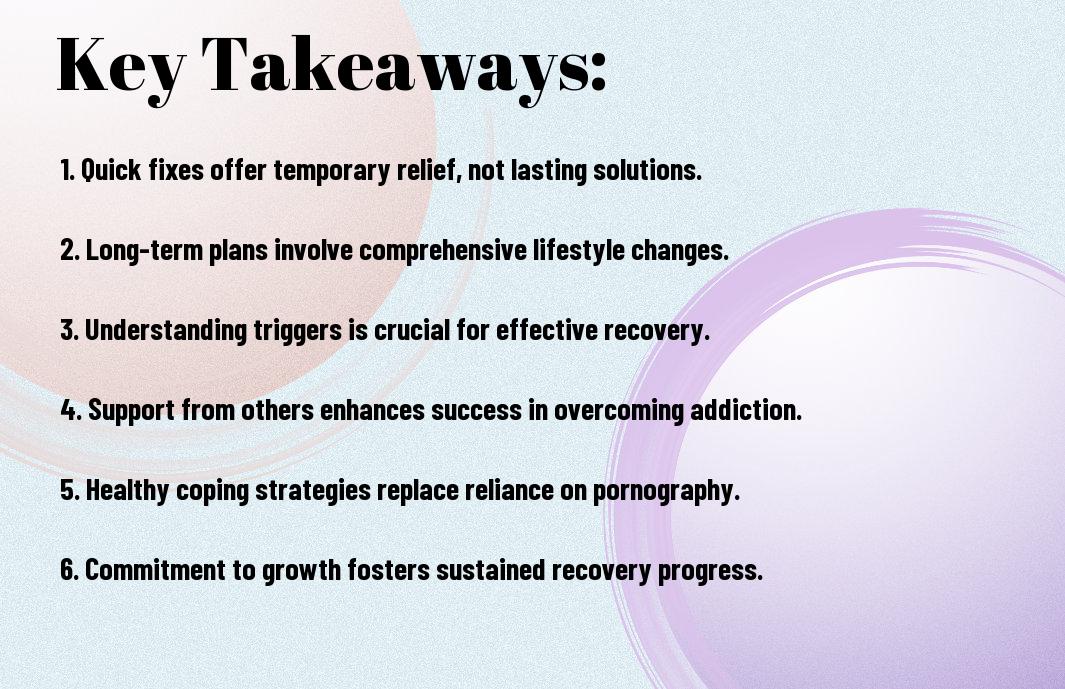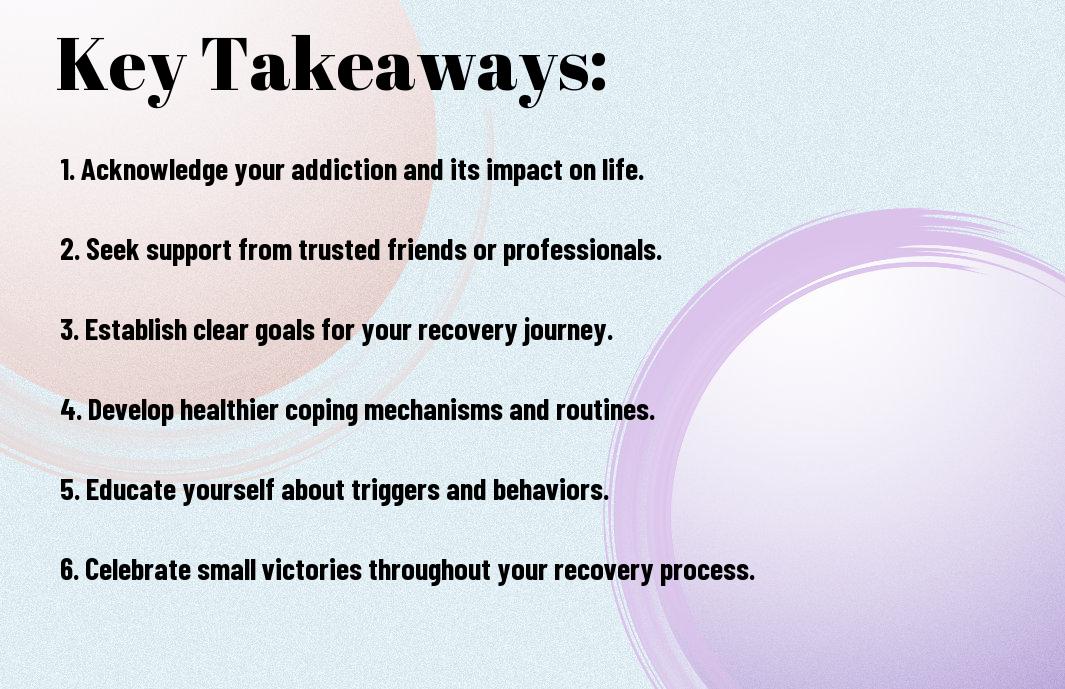Many individuals struggling with porn addiction often wonder about the recovery timeline. Understanding how long it takes to regain control over your habits is crucial for your journey toward healing. This post will explore the various factors influencing recovery time, including personal commitment, support systems, and the impact of individual circumstances. By gaining insights into the process, you can better prepare yourself for the challenges ahead and set realistic expectations for your recovery journey.

Key Takeaways:
- Porn addiction recovery can vary significantly from person to person, often taking weeks to months.
- Withdrawal symptoms may include anxiety, irritability, and cravings, similar to other types of addiction.
- Developing a supportive network, including therapy and support groups, can enhance recovery success.
- Setting realistic goals and tracking progress helps maintain motivation throughout the recovery process.
- Identifying and addressing underlying emotional or psychological issues is important for long-term recovery.
- Replacing unhealthy habits with positive activities, such as exercise and hobbies, can aid in transitioning away from pornography.
- Patience and self-compassion are imperative; setbacks may occur, but they do not signify failure.

Understanding Porn Addiction
To comprehend porn addiction, it is crucial to recognize that it affects many individuals across diverse backgrounds. This condition often manifests through compulsive behaviors surrounding the consumption of pornographic material, leading to negative impacts on personal relationships, work, and mental health. Being aware of this addiction helps you take necessary steps toward recovery.
Definition and Symptoms
Porn addiction can be defined as an excessive and compulsive use of pornographic content that interferes with your daily life. Symptoms may include an inability to reduce or control your consumption, increased secrecy about viewing habits, and neglect of responsibilities or interests that used to be important to you.
Psychological Effects
Beside the blatant signs of addiction, the psychological effects of porn addiction can be profound and far-reaching. These may manifest as anxiety, depression, or negative self-esteem. You might find that your perceptions of intimacy and relationships become distorted, ultimately affecting your connection with others.
Further exploration of the psychological effects reveals that porn addiction can create a cycle of guilt and shame, leading you to retreat further into isolation. As you become more dependent on porn for gratification, you may find it harder to establish genuine emotional connections, which can create a sense of loneliness. Over time, this can erode your self-worth and lead to increased feelings of inadequacy, leaving you trapped in a vicious cycle that is difficult to escape without intervention.

Recovery Process
Clearly, the recovery process from porn addiction is not a linear journey but rather a path filled with ups and downs. You will experience a range of emotional and physical changes as you work through your challenges. Engaging with a support group or a mental health professional can provide you with guidance and tools to navigate this transition, enabling you to reclaim control over your life and relationships.
Stages of Recovery
To understand your recovery, it is vital to identify the stages involved. Each stage represents a unique aspect of your healing journey. You may find that you cycle through these stages multiple times, as recovery is an ongoing process that requires patience and dedication.
Duration of Each Stage
Recovery from porn addiction varies widely in duration, depending on individual circumstances. Each stage can last anywhere from weeks to months, influenced by factors such as the severity of addiction, personal motivation, and available support systems.
Stages of recovery often unfold over time, beginning with awareness and acknowledgment of the problem. You might then move into acceptance, followed by making behavioral changes. Each stage may require different lengths of time to navigate based on your specific experiences and emotional state. It’s vital to be gentle with yourself during this process, as progress may not always be immediate. Emphasizing personal growth and healing can facilitate a more effective recovery journey.
Factors Influencing Recovery Time
Keep in mind that various factors can affect how long it takes you to recover from porn addiction. These include:
- Your level of addiction
- Your psychological makeup
- Access to treatment resources
- Support from friends and family
Assume that understanding these factors can help you better navigate your journey. For more insights, check out How to Stop a Porn Addiction: Samarpan’s Practical Guide.
Individual Differences
To fully grasp the recovery process, it’s vital to acknowledge that individual differences play a significant role. Your emotional resilience, coping mechanisms, and past experiences can all shape how you respond to treatment and setbacks along the way.
Support Systems
Against this backdrop, having a robust support system can significantly impact your recovery journey. People who surround you, including friends, family, or support groups, can provide emotional encouragement and hold you accountable.
Even small acts of support, like having someone to discuss your feelings with or share your progress, can boost your motivation and help you stay committed. Strong relationships often create a positive environment, making it easier for you to face challenges and remain focused on your recovery goals.
Strategies for Overcoming Addiction
Your journey to overcome porn addiction can be effectively navigated by employing a combination of strategies tailored to your needs. Recognizing triggers, establishing supportive environments, and setting clear goals will empower you to take control of your impulses. Incorporating mandatory breaks from digital devices and engaging in healthier activities can significantly reduce cravings and reinforce your commitment to recovery.
Professional Help
For many, seeking professional help can provide vital support on the road to recovery. Therapists specializing in addiction can help you identify underlying issues, develop coping strategies, and offer accountability. Joining support groups allows you to connect with others facing similar challenges, fostering a sense of community and encouragement.
Self-Help Techniques
For those preferring to take matters into their own hands, self-help techniques offer valuable methods to regain control. Journaling, meditation, and engaging in physical fitness can help you redirect energy and focus on positive habits. Setting up a structured daily routine can also provide stability and aid in breaking the addiction cycle.
In fact, self-help techniques can create a significant impact on your recovery process. By incorporating mindfulness practices, you can develop greater awareness of your triggers and emotional responses, allowing you to make informed decisions. Furthermore, engaging in hobbies or new interests acts as a welcome distraction from cravings, ultimately helping to solidify your commitment to overcoming addiction.

The Role of Relapse
For many facing porn addiction, relapse can feel discouraging and overwhelming. Understanding that it is often a part of the recovery journey allows you to approach your path with realism and patience. Successful recovery involves navigating setbacks, learning from them, and continuing to move forward, rather than letting relapse define your progress.
Understanding Relapse
To effectively manage your recovery, it’s important to recognize what triggers a relapse. Acknowledging the emotional and situational factors that contribute to these setbacks can empower you to develop strategies to counteract them. By viewing relapse not as a failure, but as an opportunity for growth, you can enhance your resilience and commitment to recovery.
Coping Mechanisms
Beside understanding your triggers, cultivating effective coping mechanisms is vital in your recovery journey. These strategies not only help you manage cravings but also strengthen your overall well-being, making you less susceptible to relapse. Incorporating mindfulness practices, engaging in physical activities, and building a support network are practical ways to maintain focus and enhance self-discipline.
Understanding the importance of coping mechanisms in your recovery can make a significant difference. You might consider journaling your thoughts and feelings, which can help you identify patterns and triggers. Additionally, exploring new hobbies or interests can provide a healthy distraction. Surrounding yourself with supportive individuals or groups who share similar goals can offer encouragement and accountability, further reinforcing your resolve to overcome addiction. Ultimately, these strategies can create a solid foundation for lasting recovery.
Long-Term Outlook
Despite the challenges that come with overcoming porn addiction, the long-term outlook is decidedly positive. Many individuals find that after dedicating time and effort to recovery, they experience not only improved relationships but also enhanced emotional well-being and mental clarity. Although the journey may vary from person to person, maintaining focus on your goals will yield rewarding results over time.
Maintaining Recovery
Maintaining your recovery requires ongoing commitment and self-awareness. You will likely benefit from establishing a support network, whether through therapy, online forums, or community groups. Regular self-reflection and identifying triggers will help you navigate any challenges that may arise, empowering you to stay on your path to recovery.
Benefits of Recovery
After achieving recovery, you’ll uncover numerous benefits that extend beyond the absence of addiction. You may notice improved relationships, heightened self-esteem, and a renewed sense of purpose in your life.
Considering the transformative nature of recovery, the benefits can significantly enrich your day-to-day existence. Freed from the compulsions of porn addiction, you will have more energy to invest in meaningful activities and relationships. As you reclaim your time and focus on personal growth, you’ll find yourself embracing new opportunities for connection and fulfillment, ultimately leading to a more balanced and rewarding life.
Conclusion
Ultimately, overcoming porn addiction is a personal journey that varies for everyone. The recovery timeline depends on factors such as the severity of your addiction, your support system, and the strategies you employ. Engaging in healthy habits, seeking professional help, and fostering self-awareness can significantly impact your progress. Be patient with yourself as you navigate this path, and focus on building a fulfilling life beyond addiction.
FAQ
Q: What is porn addiction?
A: Porn addiction refers to the compulsive consumption of pornography that interferes with daily life, personal relationships, and well-being. It can lead to a range of problems, including decreased sexual satisfaction, emotional distress, and difficulty forming healthy romantic connections.
Q: How can I tell if I have a porn addiction?
A: Signs of porn addiction may include spending excessive time viewing porn, neglecting responsibilities or relationships, experiencing cravings, and using porn as a way to cope with stress or emotional issues. If you find it challenging to stop despite negative consequences, it might be worth seeking help.
Q: How long does it take to recover from porn addiction?
A: The recovery time can vary significantly from person to person. Some individuals may start to see improvements within a few weeks, while complete recovery can take several months or even years. Factors influencing recovery include the duration and severity of the addiction, individual support systems, and commitment to change.
Q: What are the stages of recovery from porn addiction?
A: Recovery typically involves several stages: acknowledgment of the problem, seeking support, making lifestyle changes, developing coping strategies, and ongoing maintenance. Each individual may progress through these stages at their own pace, often requiring time and patience.
Q: Are there any methods or treatments to help with recovery?
A: Yes, various approaches can aid in recovery from porn addiction. These may include therapy (such as cognitive-behavioral therapy), support groups, self-help resources, and lifestyle changes. Seeking guidance from a mental health professional can provide tailored strategies for overcoming the addiction.
Q: Can physical withdrawal symptoms occur during recovery?
A: Some individuals may experience withdrawal-like symptoms during recovery, such as anxiety, irritability, mood swings, and cravings. This is a normal part of the process as the brain adjusts to a reduced dependency on pornography. Engaging in supportive activities can help mitigate these symptoms.
Q: Is it possible to relapse during the recovery process?
A: Relapse is common during recovery and should not be seen as a failure. It is important to approach any setbacks with understanding and to utilize them as learning experiences. Continuing to seek support and reinforcing healthy coping mechanisms can aid in staying on track after a relapse.










